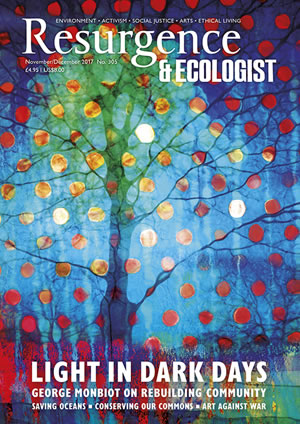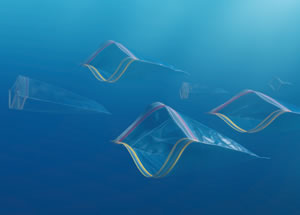Hardly a day passes without news on ocean plastic, and the news is generally bad. As I write, the latest is that minute particles of plastic in our seas build up a thin film of algae, which emit the gas dimethyl sulphide. As it happens, many small fish are acutely sensitive to the gas, and highly attracted to it, as it signals to them the presence of food.
The fish eat the plastic, along with the persistent organic toxins (like PCBs) that also glue themselves onto the particles. And so the plastic and the poisons enter into the food chain, and ultimately into higher-level predators – a category that, incidentally, includes humans. What goes around comes around.
Of course, big bits of plastic such as fishing nets, drinks bottles and bags also cause terrible damage – choking and strangling sea birds, turtles, cetaceans and other diverse and wonderful forms of life, or blocking up their digestive tracts. And they break up into tiny pieces under the relentless action of wave, wind and sun. In a nutshell, ocean plastic is an ecological toxin: an agent of global marine ecocide. There ought to be a law against it! Well as it happens, there is. Not just one law, but several.
My own ocean plastic journey began with an idea for a new international law to put an end to marine plastic pollution (MPP). Something like the Montreal Protocol, for example, which has successfully regulated ozone-eating chemicals such as CFCs, imposing legally binding obligations on those states that have signed up, but also sharing technical expertise and offering funding to those that need it. But first it made sense to examine existing international maritime and environmental laws to see what, if anything, was already there.
I soon got my answer. The United Nations Convention on the Law of the Sea, which came into force in 1994, already requires states to “prevent, reduce and control pollution of the marine environment from any source” and to “ensure that activities under their jurisdiction or control are so conducted as not to cause damage by pollution to other States and their environment”.
The 1972 London Convention and its 1996 Protocol, which regulate the dumping of wastes at sea, already require states to “protect and preserve the marine environment from all sources of pollution”, where pollution means “the introduction, directly or indirectly, by human activity, of wastes or other matter into the sea which results or is likely to result in such deleterious effects as harm to living resources and marine ecosystems”.
The Basel Convention, which came into force in 1992, regulates the transboundary movement of waste in order to “protect, by strict control, human health and the environment against the adverse effects which may result from the generation and management of hazardous wastes and other wastes”, and is drafted so as to include within its terms even wastes moving from one state to another by the action of wind, wave and tide. While MPP does not directly come under the scope of the Basel Convention, all that states need to do to bring it within the treaty’s ambit is to classify unsorted plastic waste as ‘hazardous’ in their domestic legislation.
Also applicable is customary law, the international version of common law, which reflects the accrued norms of behaviour between states. One precept of customary law is a prohibition of transboundary harm from one state to another – and the movement of MPP from the land of one country to the shores of another is a clear example of that. Another element of customary law is the public trust doctrine, which states that governments must act as trustees to manage commons (such as the high seas) and natural resources as the common heritage of humankind, solely in the interests of present and future citizens.
And then there are numerous regional treaties. For example, Africa has its own version of the Basel Convention, the Bamako Convention, which came into effect in 1998 and also suits our purposes. In Europe there is the 1998 OSPAR Convention for the Protection of the Marine Environment of the North-East Atlantic, which comprises 15 European countries and the EU and requires them to “take all possible steps to prevent and eliminate pollution” and to “protect the maritime area against the adverse effects of human activities so as to safeguard human health and to conserve marine ecosystems”. No scope for argument there!
So it looks like we already have all the international laws we need to clamp down on countries responsible for generating MPP. But there is an important missing element: enforcement. Sadly for our oceans, there is no police force or prosecution service responsible for upholding international law, investigating its breaches, and taking action against transgressors. Instead it is up to individual states belonging to a treaty to take legal action under the mechanisms provided.
The one thing we do have is courts in which legal action can be taken, including the International Court of Justice, the International Tribunal for the Law of the Sea, and ad hoc tribunals as defined in each treaty. So far no state has taken legal action against another over MPP, probably because the main victims of MPP are small states, and heavy costs could be involved; taking a neighbouring country to law could be disruptive to harmonious relations; despite the apparent clarity of the law, the lack of precedent creates uncertainty as to the outcome; and few if any countries are entirely blameless in the matter.
But that’s not to say we can’t turn this situation around, given the huge public concern about the growing volumes of MPP. It is entirely possible to hold the worst plastic polluting nations accountable and force them to act, using the laws we already have. Here’s how:
First we have to find a state, or states, willing to seek legal redress for harm MPP is causing to their fisheries, tourism and environmental quality, and force the countries responsible to reduce the damage. A good place to start will be with small island states like the Maldives, Fiji, Saint Lucia and Vanuatu, which are often the victims of MPP. In 1991 they established the Alliance of Small Island States (AOSIS), to campaign for action on climate change, due to its members’ vulnerability to rising sea levels. Its mandate now extends to “sustainable development” and could easily include MPP.
And while the states are small, they are many: with its 44 members and observers, AOSIS accounts for 28% of all developing countries, and 20% of the UN’s total membership. This strength in numbers could empower them to act in concert, overcoming any fears that a solitary country might have in acting alone. It could also enable some cost-sharing in taking legal action against other states, in order to set legal precedents of common value to all. Given the growing public concern about MPP, it should also be possible to raise substantial sums to support any legal action they may take on MPP – from NGOs, foundations, and the general public through crowdfunding platforms.
Many AOSIS states have already demonstrated their willingness to act. At this year’s United Nations Oceans Conference in New York, members made a dozen commitments to limit the use of plastics and ensure their safe disposal – from phasing out non-biodegradable plastic bags, bottles and packaging (the Maldives) and banning styrofoam takeaway boxes and plastic utensils such as spoons, forks, knives, plates, bowls and cups (Seychelles) to improving waste segregation, storage and disposal at source (Samoa) and committing to become a “zero waste nation” (Singapore).
This is a good start. But before seeking legal redress, prospective litigants should further reduce their own responsibility for releasing plastic into the oceans. Fortunately this is something that the international community should be willing to help with in accord with existing commitments – such as the 1995 Washington Declaration on Protection of the Marine Environment from Land-based Activities, which calls on development funders, including UN agencies, The World Bank and regional development banks, to “ensure that their programmes support the regional structures in place for the protection of the marine environment”.
Nations considering legal action will also need to assemble compelling evidence of the ecological harm, economic losses and other deleterious impacts of marine plastic, so that their case can be made beyond any possible doubt. And they must be able to prove that a substantial proportion of the MPP they suffer from arises in the states they are acting against, for example by collecting rubbish from affected coastlines and analysing labels to identify countries of origin, and thereby establishing incontrovertible legal liability. This creates an important role for scientists, lawyers, NGOs and wider civil society in supporting MPP cases with their time, expertise and money.
Nothing in this will be quick, easy or simple. But few things worth achieving ever are. Legal action by plastic-polluted states against those countries that allow their wastes to contaminate the marine environment – or even the threat of such action – would have a powerful effect in persuading the perpetrators to reform their ways. Such is the scale and urgency of the marine plastic problem, that we should take this option forward, vigorously and effectively. Our oceans and their irreplaceable ecosystems depend on it.
To read more visit the APE website and read the report: www.apeuk.org/opli








